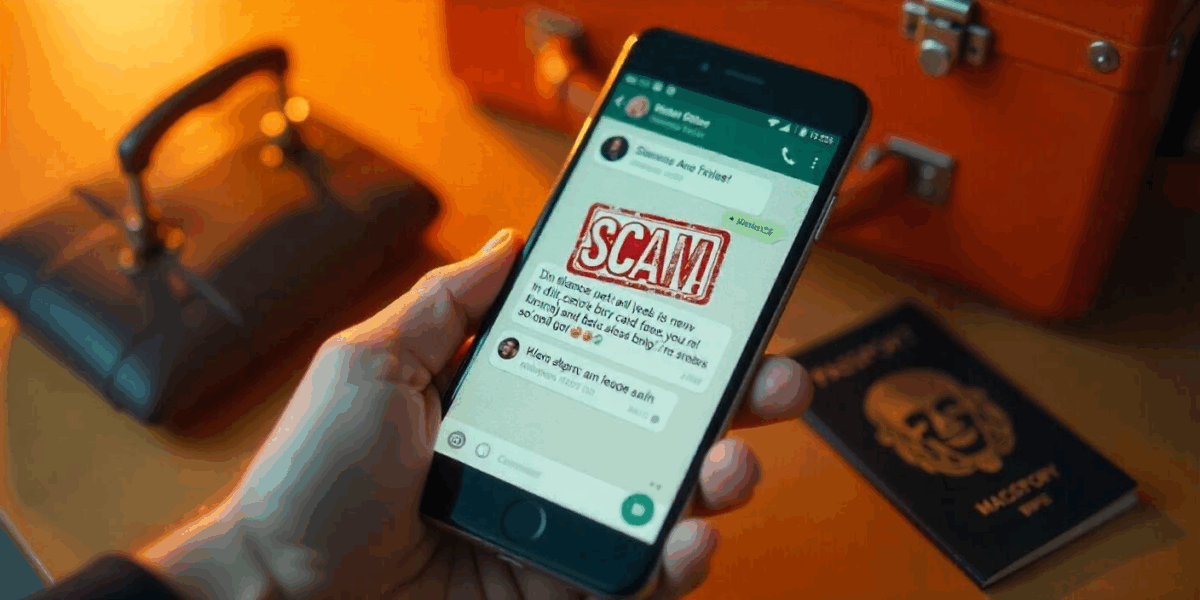Planning a vacation with your family and looking for a tour guide to make the trip worthwhile. Great idea! But what if you reach your destination just to find that your tour guide is a scammer?
Scared?
But that is something you must be aware of because of the increasing cases of the Tour Guide WhatsApp Scam.
The scam is operated to target unsuspecting tourists by impersonating legitimate tour operators on WhatsApp.
Now, such scams not only steal away your money but your trust as well.
So, before booking a travel guide, know about the scam, how it is operated, and ways to protect yourself.
Tour Guide WhatsApp Scam India
Can you get scammed on WhatsApp?
The answer is YES.
Scams like this begin on WhatsApp only.
Wondering how the scammer got your WhatsApp number?
Well, it is simple, you searched for a tour guide on any website and entered your details. But unknowingly, you’ve filled in a form on an unverified website that collects traveler data.
Now, to trick you, the scammer comes with offers like customized packages, sightseeing tours, or exclusive travel experiences.
They often pose as English-speaking guides, use real tourist photos, and even copy information from legitimate websites to appear credible.
The offers are so tempting that you easily get encouraged to open the file and click on a message that generally contains malware links that hack your phone.
Whatever their way is, their ultimate goal is to lure you into making a payment for a non-existent service or steal your personal information for financial fraud.
Modus Operandi of Tour Guide WhatsApp Scam
Like other scams on WhatsApp, this too starts with one message or call and ends up with the vanishing of the scammer with your money.
Let’s break it down to understand the sequence of events:
- Scammers steal your data from a website and contact you on WhatsApp, impersonating themselves as a certified tour guide in a specific city or country.
- He then lures you by offering personalized travel plans at discounted prices.
- To make it look authentic, he then shares a PDF brochure, or a Google photo album, and even fake testimonials.
- To make it difficult for you to crack the scam, he often creates a sense of urgency by mentioning, limited-time deal or offer.
- Once you are convinced, they ask you to send the booking amount, and once the payment is received, they disappear and block your number.
Along with this, WhatsApp video call scam is another way they use to trick you. They make a video call directly on your phone and later display disturbing videos and record your expression to blackmail you.
To maintain your social dignity, you often follow their instruction and transfer the said amount.
How to Identify a Scammer on WhatsApp?
No wonder scammers play emotional games to manipulate you, but a little awareness can prevent you from falling into the trap and losing your money.
Here are some of the signs that you can use to identify the scam:
- The sender’s number has no WhatsApp Business account, or they trick you by running a business account WhatsApp scam.
- There is pressure to book quickly with payment via unofficial channels.
- The person avoids video calls or refuses to provide links to real websites or registered company details.
- Testimonials or photos are generic or taken from other websites.
- The offer seems too good to be true, especially for popular tourist destinations.
What to Do if Online Fraud Happens?
In case you have identified any such scam with you or with your known ones, then take immediate action and follow the right steps:
- Collect evidence like screenshots of chat, call recordings, if any, bank transaction details, etc.
- Report to your bank to block your transactions.
- File a cyber crime complaint.
- Track cyber crime complaint status for proper follow-ups.
How to Protect Yourself
Now, it is important to be alert while clicking on any link or transferring money to an unknown source.
Here are some key points you must be aware of:
- Do proper research and always look for official websites, and do not forget to check their Google reviews.
- Do not make an advance payment online.
- Avoid sharing your details over the call or WhatsApp.
- If you’ve already paid and suspect a scam, report it immediately to your bank and register with us to file a complaint.
Final Thoughts
The tour guide WhatsApp scam is a growing concern for travelers who rely on digital communication for convenience.
While not all WhatsApp-based tour services are fake, caution and verification should always come before convenience.
Staying informed is the first step in ensuring your travels are memorable for the right reasons, not because you became a victim of online fraud.







